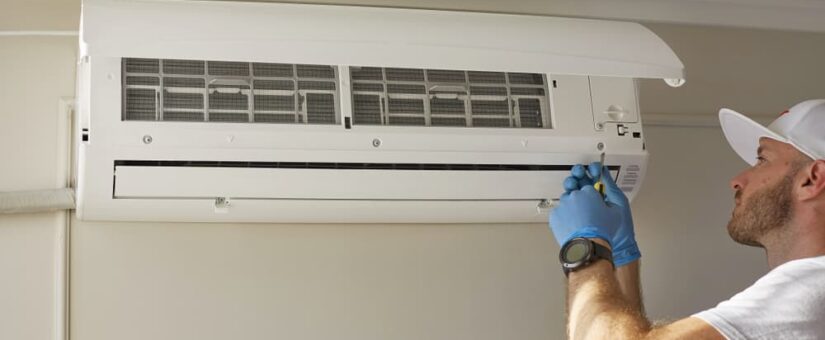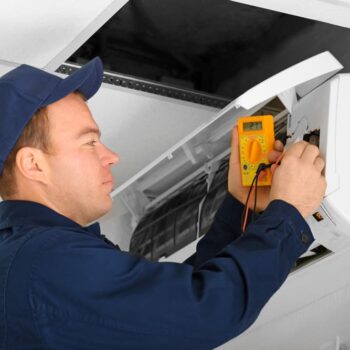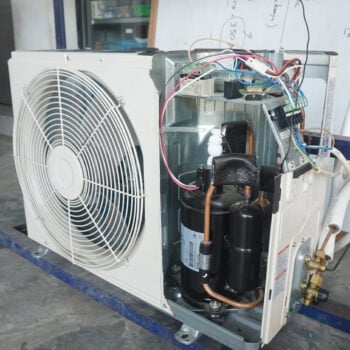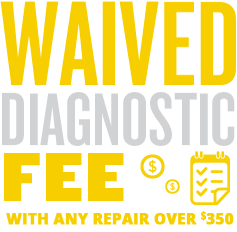
- On August 25, 2021
As you read about the common signs of a broken air conditioner, you’ll learn:
- By the time you ask, “is my air conditioner broken?” it’s probably time to schedule an inspection.
- Signs of a broken A/C can include rising utility bills, strange noises, uncomfortable temperatures, and more.
- Most A/C problems require a professional to fix, but diagnosing the problem early can save you money, time, and headaches.
Signs of a Broken A/C: Warm Air or No Air
One sure-fire way to get your blood boiling in the summer months is dealing with a broken A/C unit. Not only is a broken unit an inconvenience and a hassle, but it can also be dangerous to the physical and mental health of your loved ones, not to mention the damage extreme temperatures can cause to the structural integrity of your home. Many factors can lead to a unit malfunction, but don’t sweat it! Howard Air & Plumbing is here to help you identify the early detection signs of a broken or malfunctioning unit and give you a few tips to fix minor issues. However, due to the complexity, severity, and urgency of many A/C-related issues, understanding when it’s best to call in a professional will save you time, money, and aggravation. This summer, call a trusted technician from Howard Air & Plumbing to prevent a meltdown and help keep your family safe and cool.
It’s Blowing Warm Air and Temperatures Keep Rising
One of the first signs of a broken unit is the absence of cold air. If your unit is blowing warm air or no air at all, that’s a sure-fire sign that your unit needs to be attended to. There are several reasons your unit could be blowing warm air, many of which require a professional’s assistance.
The steadily rising temperature could indicate issues such as the following:
- A Dirty Air Filter
- Frozen Evaporator Coils
- Refrigerant Leak
The first thing to check if temperatures in your home continue to increase is the air filter in your A/C unit. The air filter helps keep your A/C unit clean, ensuring that fresh air is circulated into the machine and your home. If the air filter is dirty, that causes strain to the internal operating mechanisms of the unit, causing it to work harder, leading to a lack of efficiency and higher temperatures. Simply swap out the dirty air filter with a clean filter and see if that resolves the issue.
If a new filter isn’t the solution to your problem, you may be dealing with something a bit more complicated, such as a frozen evaporator coil. This coil extracts heat from your home and is the beginning of the cooling process. Moisture is pulled from the air and collected to then move out of the system. Occasionally, too much moisture builds up on the coil, causing it to freeze. You can temporarily relieve the issue by giving time for the coils to thaw.
This can be done by first shutting off the power to the unit. Then you can open the access door to the system’s interior components, which will allow the coils an opportunity to de-ice. Unfortunately, this can take up to 24 hours. A slightly quicker fix would be to accelerate the process by carefully directing heat over the frozen coils with a hairdryer. Applying heat to a frozen evaporator coil is only a temporary fix to the more complex moisture build-up in the unit, which should be addressed by a professional who would need to diagnose the root of the problem, so it does not become a recurring issue.
Another common issue is a refrigerant leak. Refrigerant is the chemical that powers the cooling system of the AC unit. Naturally, you’ll need regular levels of the solution in your machine to keep it operating throughout the hot summer months, but occasionally you’ll experience issues that may indicate it’s time to have a professional from Howard Air & Plumbing change the fluids. Refrigerant is toxic, so it is best to always contact a professional before attempting to handle this specific issue.
If you notice that the temperature in your home is increasing, your unit has most likely become less effective over time. The best way to prevent and address wear and tear to an A/C unit is to commit to regularly scheduled maintenance.
The Air Conditioning Won’t Turn On
The first step would be to ensure there is power flowing to the unit. Occasionally, a storm or other weather event can cause a loss of power to the unit, and one of the most common causes of an A/C malfunction is related to the connection between the unit and the power source. If you have recently experienced a power outage, your A/C unit might have been affected by a power surge. Be sure to check your electrical box to see if a breaker has been tripped. If this is the case, simply reset the breaker to turn the power back on to the unit. In many cases, this unit may have sustained extensive damage, which can be diagnosed and repaired by a qualified air technician.
You should also be sure to check the setting of your thermostat. Sometimes a family member will have turned up the temperature or turned off the unit entirely without notifying anyone else. Before you really start to sweat, make sure the settings are at their appropriate levels.
Another quick thermostat fix would be to double-check the batteries in the thermostat. A thermostat receiving inadequate power from faulty batteries can affect the efficiency of the unit. If your unit is wired and does not operate on batteries, again, double-checking the power to the unit from the breaker can sometimes resolve the issue. Apart from these superficial fixes, if your unit is still not turning on or if the unit is emitting warm rather than cool air, it is best to call a professional from Howard Air & Plumbing to remedy the problem.
Utility Bills Have Risen a Substantial Amount
Utility bills are a great way to evaluate and track the effectiveness of your unit. If you’ve noticed that your bills have increased over time, it may indicate that there is an issue with your A/C.
If you have a newer A/C unit, a rising bill could indicate a problem, and that it’s best to contact a professional before the issue worsens. The best way to prevent an increase in your monthly bill and keep your unit in peak performance mode is to contact Howard Air & Plumbing for regularly scheduled maintenance.
If the unit is older, it may have wear and tear, causing it to perform sub-optimally. This can be a big drain on your financial resources, in addition to the inconvenience of a hothouse. In the case of an older, worn-out unit, replacing it with a newer model can ultimately save you money on your monthly bills and potentially thousands in costly repairs and maintenance.
Strange Noises and Other Malfunctions
It’s not a monster that’s going bump in the night; it’s your A/C. If you are experiencing strange noises coming from your unit, that can be just as scary. Modern air conditioners operate very quietly, so if you hear unfamiliar sounds emitting from your A/C, it is probably an indicator that there is a problem. Keep an ear out for the following:
- A/C Banging Noise
- A/C Clanking Noise
- A/C Clicking Noise
- A/C Buzzing Noise
- A/C Squealing noise
- A/C Humming Noise
- A/C Chattering or Rattling Noise
If you hear any of these sounds coming from your unit, it’s time to call a professional from Howard Air & Plumbing to immediately diagnose and resolve the problem.
AC Repair and Service in Phoenix, AZ
If you think there is a chance your unit might be broken, don’t sweat it. Save yourself the time and contact a professional. For the fastest, quickest, most reliable repair service in Chandler, Gilbert, Glendale, Scottsdale, Tempe, and the surrounding areas in the valley, call the technicians you can trust at Howard Air & Plumbing.
Featured Image: Voviiik/Shutterstock


















0 Comments